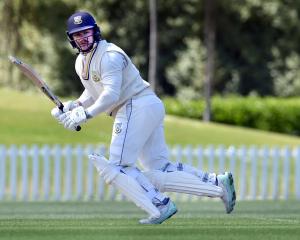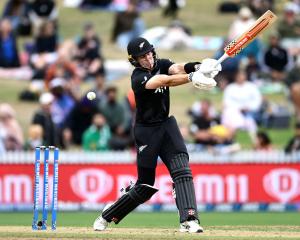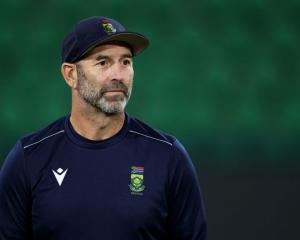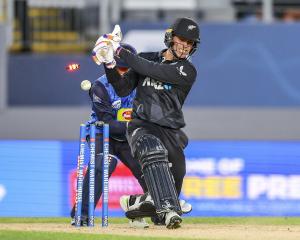Otago bowed out of the domestic twenty/20 competition after a dramatic six-run win against Auckland in its last match.
The win, though, came about three overs too late to sneak into the final.
Cricket writer Adrian Seconi looks back at the highs and lows.
Wonderful one day, woeful the next.
It is not the new motto for Dunedin city as far as we know, but it pretty much sums up Otago's defence of its twenty/20 crown.
Inconsistent, erratic, unpredictable, magnificent, superb and brilliant also come to mind.
It was a campaign full of highs and lows and one in which Otago would have been a worthy finalist had it managed to find consistency in the dictionary.
The Volts' campaign culminated with a dramatic tie against Auckland.
Otago went on to win the match by six runs in the eliminator over but victory came too late.
Auckland and Otago finished the round robin tied on 24 points but Auckland progressed courtesy of a superior net run rate.
The game was, in a way, a mirror view of the season.
Auckland had slumped to 71 for six but Otago released the pressure with a series of uncharacteristic fumbling efforts in the field.
Where there was assurance, suddenly there was resignation.
A quick pep talk during the break lifted the mood but the early departure of Brendon McCullum helped nurture any remaining doubt which swelled to melancholy when the skipper Craig Cumming and the in-form Neil Broom were dismissed.
But it is not that easy to burst the bubble of confidence which surrounds the McCullum brothers.
Brendon missed out but older brother Nathan McCullum played an extraordinary knock, blasting his side back into contention.
Ultimately, though, it was too little too late.
The match had already got away on Otago and the real target - 172 in 17.3 overs or less - had lapsed by the time he was dismissed for a hard-hit 61 off 35 deliveries.
If Otago had held its catches a smaller target might have been reached.
Otago might also lament two washed-out games against a weak Wellington side.
Wins in those matches would have changed the equation.
And if the Volts had not capitulated during a modest run chase against Central Districts at Pukekura Park, they would probably have hosted the final.
With three round-robin matches remaining Otago was at the top of the table and on course to defend its title.
It had played some great cricket and had every right to feel confident.
Brendon McCullum had just smacked a memorable undefeated ton and, in the same match, Ian Butler had claimed a record haul of six for 28.
Canterbury was next and promised to offer little resistance.
Otago did enough to win the match, scoring a defendable 185 for four.
The Volts lost some momentum while Broom was getting established, but Cumming played a gem of an innings with 53 from 29 deliveries.
Canterbury ran down the total with surprising ease thanks to some very ordinary bowling.
Leg-stump full tosses should get hit over square leg for six and half volleys should disappear through the covers.
And they did.
The batting line-up misfired in the next game, posting a forgettable 121 for nine.
Jamie How anchored the chase with a half century in a four-wicket win for Central Districts.
That lost left Otago needing to do more than just win its last match.
While Otago did not finish the campaign as it would have like it played some sparkling cricket earlier in the tournament.
Cumming timed and placed the ball, often with perfect execution, and Nathan McCullum showed what he is capable of, particularly with the bat.
And he was simply exceptional in the field.
Butler was effective with 14 wickets at 12.78 and chipped in with 96 runs.
He picked up a muscle strain in the last match but should be fit for the international limited-overs series against Bangladesh beginning next month.
Broom scored 201 runs at 25.12 but his strike rate of 113.55 was not up with the leading players.
Pakistan international Yasir Arafat did not have the impact Otago was hoping for.
He was useful enough with the ball, taking eight for 23.25, and there was nothing wrong with his economy rate of 6.64.
But he failed to live up to his billing as a useful lower-order bat and never dominated a match.
Warren McSkimming was almost as expensive as Neil Wagner but took a quarter of the wickets.
His return of four for 200 at an economy rate of 8.69 was disappointing.
Back-ups Mat Harvie and Anthony Bullick can count themselves unlucky not to have been provided an opportunity.
Bullick, in particular, has made steady progress this summer.
Wagner took 12 wickets but conceded 8.76 runs an over.
Wickets are useful but a low economy rate is king in twenty/20.
Wagner needs to find the right balance between attack and patience if he wants to push for higher honours once the South African-born player qualifies.
Nick Beard dropped a crucial catch but he is a bowler with a bright future.
The left-arm spinner made an impact when he played, taking seven wickets at 16.14.
He was also the most frugal of the full-time bowlers at 6.45 runs.
Derek de Boorder effected a sharp stumping and took nine catches.
But he did not get much opportunity with the bat and perhaps Otago might have looked to play Shaun Haig instead.
He is an adequate keeper and has his share of misses with the bat.
But when he comes off, it is often in a spectacular way and he is more dynamic with the bat than de Boorder, who is useful but not a big boundary hitter.
Opener Hamish Rutherford had his moments but he did not have the impact he had last summer.
The Volts face an uphill battle to make the one-day play-offs.
They are last with just one win from five matches and, to make matters worse, will have to do without Black Caps Brendon McCullum, Ian Butler, Nathan McCullum and Neil Broom for some or all of their remaining three round-robin matches.
The good news is top-order batsman Aaron Redmond appears to be back to fitness after struggling with a groin injury for the past two months.












